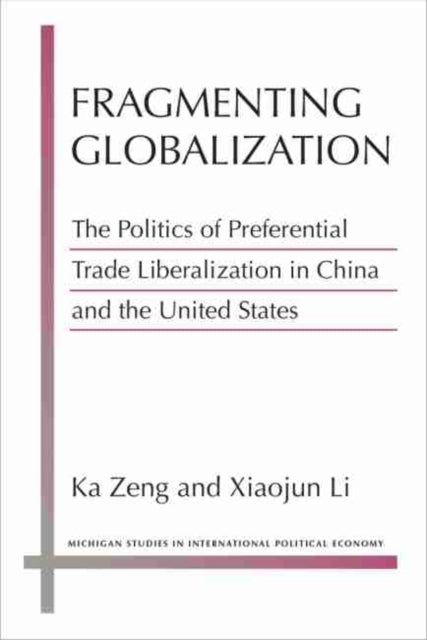Ka Zeng,Xiaojun Li
Fragmenting Globalization: The Politics of Preferential Trade Liberalization in China and the United States
Fragmenting Globalization: The Politics of Preferential Trade Liberalization in China and the United States
- Condition: Brand new
- UK Delivery times: Usually arrives within 2 - 3 working days
- UK Shipping: Fee starts at £2.39. Subject to product weight & dimension
Bulk ordering. Want 15 or more copies? Get a personalised quote and bigger discounts. Learn more about bulk orders.
Couldn't load pickup availability
- More about Fragmenting Globalization: The Politics of Preferential Trade Liberalization in China and the United States
Global supply chain integration is a rapidly growing feature of international trade that is responsible for fundamentally changing trade policy at international and domestic levels. Ka Zeng and Xiaojun Li argue that it pits firms and industries that are more heavily dependent on foreign supply chains against those that are less dependent on intermediate goods for domestic production. Businesses whose supply chain would be disrupted as a result of increased trade barriers should lobby for preferential trade liberalization to maintain access to those foreign markets, while businesses whose products are used in the production of goods in foreign countries should also support preferential trade liberalization to compete with suppliers from other parts of the world. Fragmenting Globalization uses multiple methods to show that the growing fragmentation of global production, trade, and investment is altering trade policy away from the traditional divide between export-oriented and import-competing industries.
Format: Paperback / softback
Length: 320 pages
Publication date: 30 March 2021
Publisher: The University of Michigan Press
Global supply chain integration is a rapidly growing feature of international trade that is responsible for fundamentally changing trade policy at international and domestic levels. According to Ka Zeng and Xiaojun Li, global supply chain integration pits firms and industries that are more heavily dependent on foreign supply chains against those that are less dependent on intermediate goods for domestic production. This means that businesses whose supply chain would be disrupted as a result of increased trade barriers should lobby for preferential trade liberalization to maintain access to those foreign markets. Additionally, businesses whose products are used in the production of goods in foreign countries should also support preferential trade liberalization to compete with suppliers from other parts of the world.
Fragmentation of Globalization uses multiple methods to analyze the pattern of Preferential Trade Alliance formation by existing World Trade Organization members, a firm-level survey, and case studies of the pattern of corporate support for regional trade liberalization in both China and the United States. Zeng and Li show that the growing fragmentation of global production, trade, and investment is altering trade policy away from the traditional divide between export-oriented and import-competing industries.
One of the key findings of Fragmentation of Globalization is that the growing fragmentation of global production, trade, and investment is altering trade policy away from the traditional divide between export-oriented and import-competing industries. This is because firms and industries that are more heavily dependent on foreign supply chains are at a disadvantage when trade barriers are increased, while firms and industries that are less dependent on intermediate goods for domestic production are at an advantage.
To address this issue, businesses whose supply chain would be disrupted as a result of increased trade barriers should lobby for preferential trade liberalization to maintain access to those foreign markets. Additionally, businesses whose products are used in the production of goods in foreign countries should also support preferential trade liberalization to compete with suppliers from other parts of the world.
Fragmentation of Globalization provides a comprehensive analysis of the pattern of Preferential Trade Alliance formation by existing World Trade Organization members, a firm-level survey, and case studies of the pattern of corporate support for regional trade liberalization in both China and the United States. It shows that the growing fragmentation of global production, trade, and investment is altering trade policy away from the traditional divide between export-oriented and import-competing industries. By lobbying for preferential trade liberalization and supporting regional trade liberalization, businesses can ensure that they remain competitive in the global market.
Weight: 438g
Dimension: 152 x 228 x 23 (mm)
ISBN-13: 9780472054701
This item can be found in:
UK and International shipping information
UK and International shipping information
UK Delivery and returns information:
- Delivery within 2 - 3 days when ordering in the UK.
- Shipping fee for UK customers from £2.39. Fully tracked shipping service available.
- Returns policy: Return within 30 days of receipt for full refund.
International deliveries:
Shulph Ink now ships to Australia, Belgium, Canada, France, Germany, Ireland, Italy, India, Luxembourg Saudi Arabia, Singapore, Spain, Netherlands, New Zealand, United Arab Emirates, United States of America.
- Delivery times: within 5 - 10 days for international orders.
- Shipping fee: charges vary for overseas orders. Only tracked services are available for most international orders. Some countries have untracked shipping options.
- Customs charges: If ordering to addresses outside the United Kingdom, you may or may not incur additional customs and duties fees during local delivery.


